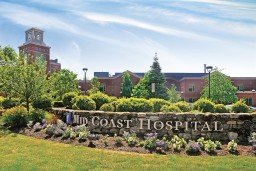Bowdoin Teams up With Mid Coast Hospital for New Mindfulness Health Program
By Tom PorterIt’s called Mindfulness-Based Stress Reduction, or MBSR, and Hannah Reese hopes it will help many Brunswick area residents enjoy good health in 2016. The Bowdoin College Assistant Psychology Professor is helping teach a new MBSR program being launched at Mid Coast Hospital this month. With the link between stress levels and health problems so well established, says Reese, this is a good way to cope with chronic illness or just stay healthy.
“It’s an intensive eight-week course,” she says, stressing the “intensive” part. “There’s a significant time commitment, two-and-a-half hours a week plus homework.”

This commitment is essential, she says, because the only way you can benefit from the program is to practice mindfulness techniques, which takes time. Mindfulness, a pursuit has that grown considerably in popularity in recent years, is an acute awareness of the present moment.
The key to mindfulness, says Reese, is a non-judgmental attitude: “Choosing to see things right now at this moment as they are, rather than seeing them through expectations. It’s about stepping back from your emotions.”
Ben Tipton is a physician assistant and one of three MBSR instructors at Mid Coast Hospital. He got into Mindulfness-Based Stress Reduction about seven years ago, he says, and it’s made a big difference to him as a practitioner.
“Mindfulness-based interventions in healthcare have really changed how I practice medicine.” Tipton says he no longer focuses as much on always trying to fix a problem as he does on helping patients find their own way towards better health through becoming more mindful. Sometimes this involves learning to accept living with an illness. “We often become so consumed by health issues that we forget all the good things that are happening.”

MBSR has also helped Tipton personally, as it has many of his colleagues, he says. “There’s a lot of burnout among medical professionals,” he says, and Tipton was no exception. “MBSR not only helps my patients but it also helped me at difficult time in my career when I was showing symptoms of mental exhaustion.”
The Mid Coast program is proving popular with the general public. The maximum fifty-two people signed up for it at a recent orientation session with more on the wait list for the next series of classes in May and June, says Cate Parker. She’s a registered nurse at Mid Coast Hospital, where she directs the community health and wellness program.
“Three different classes will be held every week for eight weeks,” she says. “They’ll begin by learning the of what awareness is: putting food in your mouth and remembering to taste it, for example.”
The first few weeks are particularly hard work, says Parker, who herself completed the course along with other staff members at Mid Coast in a pilot program last year.
“It’s a progressive learning experience,” she says, “and the first few sessions I didn’t feel I was learning much at all.” But about five or six weeks in, Parker says she experienced a ‘eureka’ moment, “and it’s like your mind and body have totally caught onto it.

And once you’ve learned the process,” she adds, “it’s easy to get to that place of being relaxed and connected.” After eight weeks, the program culminates in a day-long retreat where the class sits in silence for six hours, doing meditation and breathing exercises.
Parker says about two-thirds of those signing up for the program have no specific health issues to address and are just doing it for the wellness benefit.
“Stress reduction techniques like this can help bring down high blood pressure,” she says, “which of course can lead to chronic health problems if not treated.” The ultimate aim of the program, she says, is to keep more people away from the hospital.
As for those who are facing serious health issues, Bowdoin’s Hannah Reese says MBSR, while not a curative in itself, can help people deal with chronic disease. “People who are very ill are often chronically stressed by their illness, and this stress merely adds to their medical problems.”
Another benefit to having the mastered Mindfulness Based Stress Reduction, says Reese, is that you’ve learned techniques you can use pretty much anywhere, anytime.



